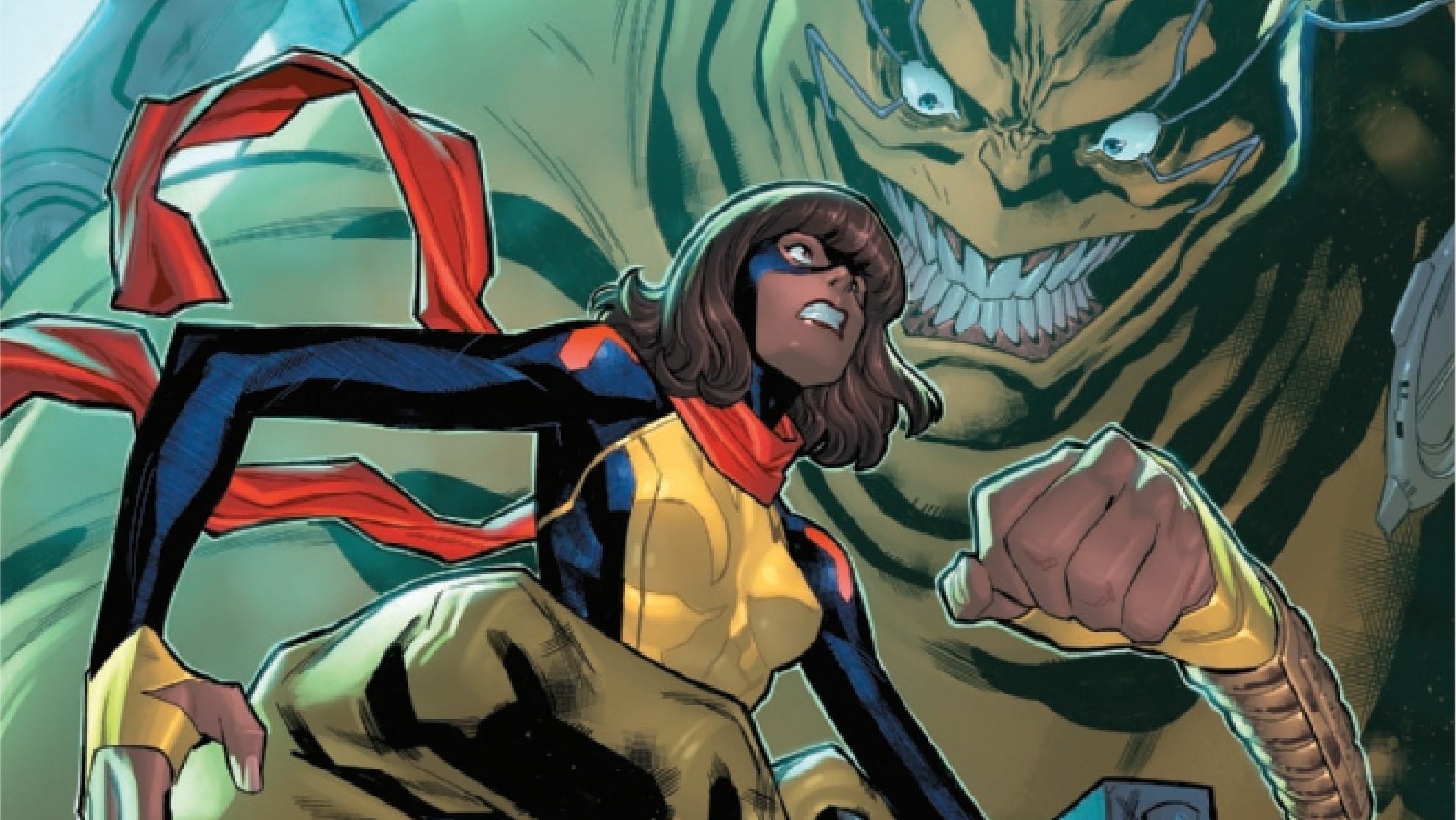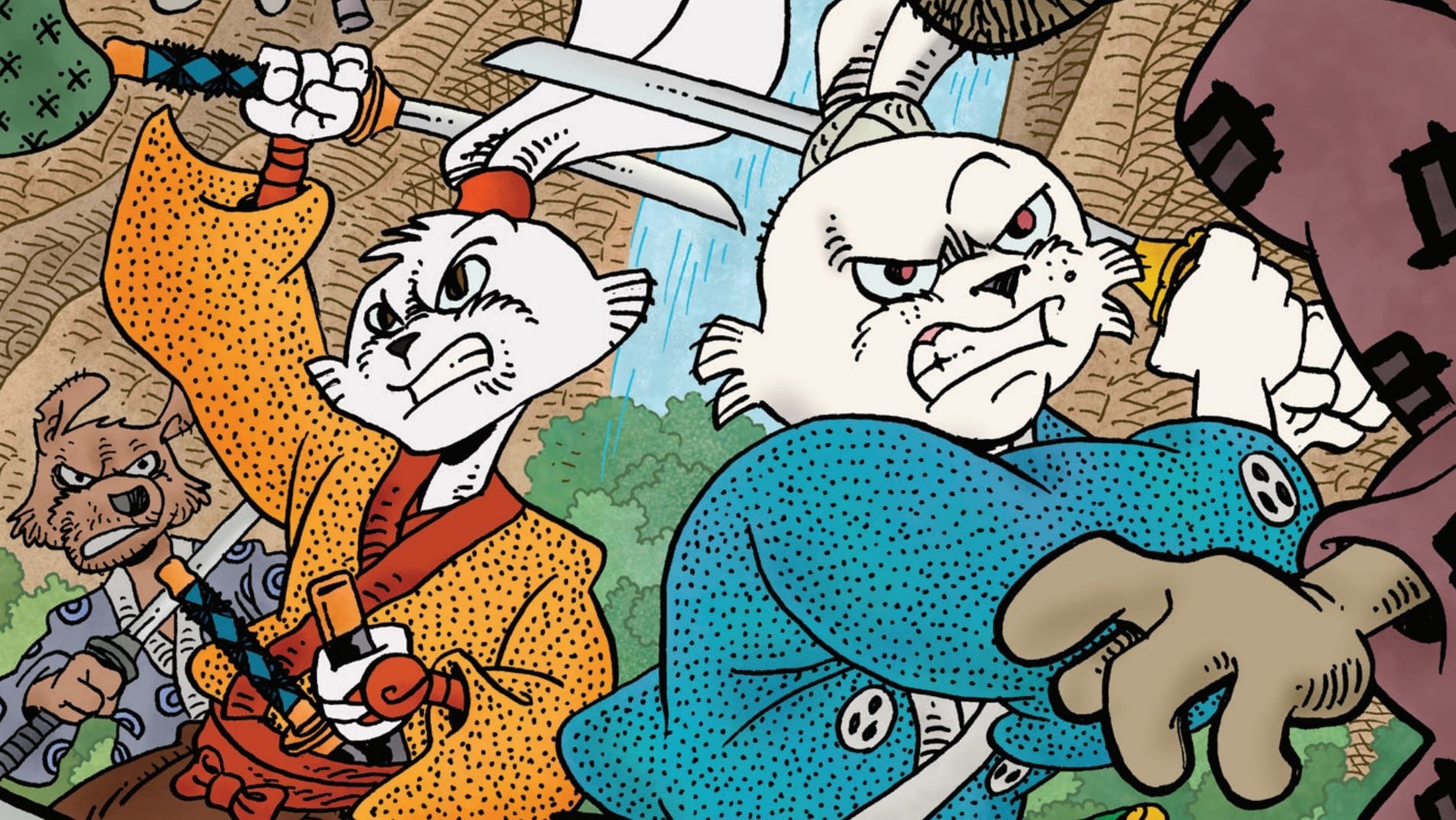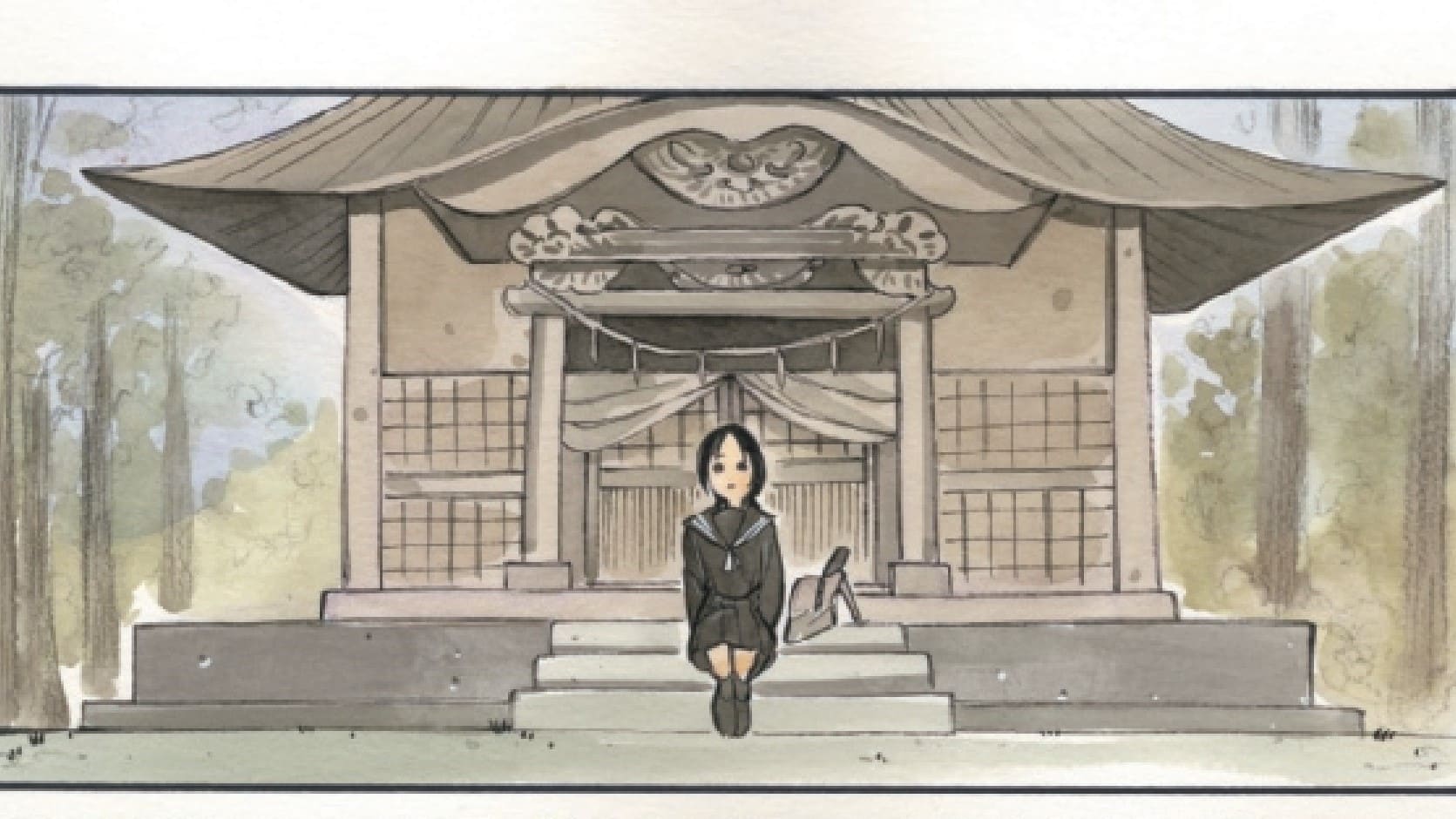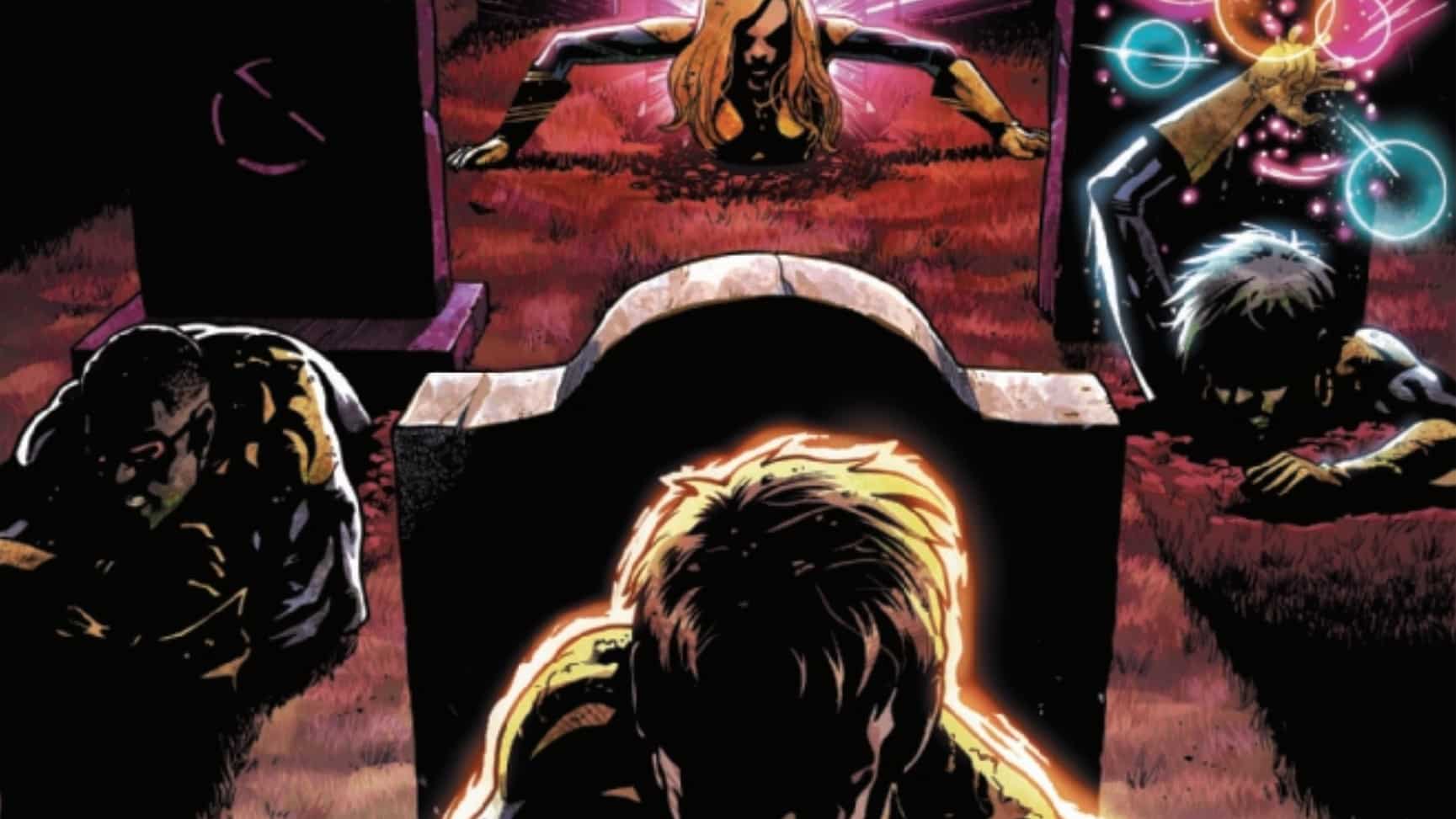On the day of Moon Knight #10’s publication, the second episode of the Disney+ show will air. The first episode introduced one of superhero comics’ most bizarre and fascinating characters to a massive audience. Many of Marvel’s recent movie offerings feel the need to acknowledge directly how silly its subject matter is, apologize for it, and, if possible, move away from it, all while offering unfinished CGI, gray masses of bodies in weirdly lit fields, and in-movie commercials for the next installment. The Marvel TV Shows have had a better time of it; WandaVision was allowed to be a tiny bit experimental, was allowed to be a tiny bit weird, at least in its first few episodes, and Loki was allowed to approach comic book nonsense without too many winks. Moon Knight started, I think, as the strongest of all them yet, and others seem to agree. It didn’t just have meta-banter; it had real jokes. When Oscar Isaac mumbles to Ethan Hawke that he’s heard of Avatar, yeah, he remembers, it’s the one with the blue people, oh wait, maybe he meant the anime— he’s not quipping at the camera, but rather neurotically failing to talk his way out of a situation. It also plays the horror of Steven Grant’s situation— not knowing what parts of his life are real— straight. Moon Knight himself is allowed to be grotesque. If the series continues with this approach, it should be a lot of fun.
This isn’t a review of the second episode or the television series (no screeners for me, alas), but it remains the most important context for this comic book. Likely the comic only was allowed to exist because of the existence of the tv show; if the book finds a wider audience than the ultra-niche, tiny group of American Direct Market comics readers, or if this essay finds a wider audience than the even tinier crowd of people who read obscure fansites devoted to American Direct Market publisher comics, it will be because the television show has boosted this article in some algorithm. A search engine will look for things mentioning Moon Knight, Marvel Comics, Khonshu, Steven Grant, Marc Spector, and so on and so forth, and it will, possibly, find this article.
But I don’t want to try to speak to that wider audience here, or persuade them to read this comic. After 14 years of the MCU, it has become very clear that the vast majority of people who enjoy those movies and tv shows, even the vast majority of the super-fans, the ones that build their sense of self on their consumption of the Disney Corporation’s entertainment products, are not willing to read a comic book. It doesn’t matter how good the comic is; it doesn’t matter how accessible the comic is; it doesn’t matter how easily one might access that comic. Moon Knight watchers will not become Moon Knight readers. Perhaps this is due to an aversion to reading in general; perhaps this is due to an aversion to any stories not in canon with the universe one loves. I won’t criticize MCU fans for either of these faults, given how common they are among comic readers too.
No, I’m talking about the TV Show because I expect, even if Episode 2 exceeds the success of Episode 1, the publication of that episode and of this issue on the same day only serves to emphasize how much more interesting and how much more fun these comics will always be compared to their mainstream counterparts.
This is the comics’ Moon Knight’s status quo: the fist of Khonshu imprisoned that god for crimes against the cosmos. Moon Knight remains in service to the ideals of his religion even while he rejects the religion’s god, vowing to protect all travelers by night. In service to this, he has opened a detective agency, where he works with a vampire, a deradicalized HYDRA agent, and a sentient house. His supporting cast is rounded out by Tigra, an Avenger/Cat Lady, and Hunter’s Moon, the other fist of Khonshu. His primary villain is Zodiac, who creates the constellations of plot across which the Moon Knight proceeds. Oh, and he’s got a therapist, who functions as a framing device and partial narrator, who is an expert in the neurology and psychology of human beings whose minds have been touched and altered by gods, aliens, or other higher powers.
Moving quickly, you could probably read these 10 comics in the same time it would take you to watch the first two episodes of the tv show. In that time you would experience not only the establishment of the above status quo, but multiple individual stories and at least one larger story arc. You’d get to see Moon Knight offer a haunted house a job. You’d follow the Hunter’s Moon as he tracked down a rogue myth, a legend that was promising to evolve into a new god. Throw in the Devil’s Reign tie-in, and you’d get to see Moon Knight enter what is, functionally, a pro-wrestling prison tournament.
If you’re a long-time fan of the character, you also get to see stories from classic runs take new interesting turns (e.g. the rogue myth), you get to see recent character arcs extended (e.g. Marc finally working on his mental health with a therapist), and you get to see the influence of the wider shared universe (e.g. the Devil’s Reign issue). The MCU isn’t really designed for any of this; it hasn’t existed long enough for a pull into old material, it tends to drop or repeat character arcs as plans shift between one movie and the next, and stories can’t be happening simultaneously, or else one might split the audience. The closest the MCU has gotten to approaching Comic Book Continuity is No Way Home, a movie which, rather than consider what interesting stories might be told with characters from the past, primarily is constructed in reverse, looking for a story in which the appearance of past characters might be justified.
Thus far, this volume of Moon Knight has exemplified everything I love about comics. It asks questions like “Wait, if Moon Knight is ‘The Fist of Khonshu’– aren’t there normally two fists?” or, “If human beings really could get visions from godlike beings, how would that affect their brains?” or, “If a haunted house is sentient, couldn’t you do things like hire it for a job?” It juxtaposes extremely thoughtful genre fiction about the creation and evolution of myth with moments where a guy in a moon costume beats up another guy in a different moon costume with a baseball bat. Moon Knight #10 continues what we’ve seen in previous issues— he meets with his therapist and encounters a new challenge from Zodiac— but much of what we see is new. As the characters note on the first page, this is an issue of change. A character is added to the supporting cast, one whose mind mirrors Marc’s, though he was broken by something human rather than divine. A threat rises up not from Moon Knight’s past but a strange, grotesque, obscure corner of another hero’s continuity. Most importantly, the line between the frame narrative and the central narrative begins to break. The familiar rhythms of the book have shifted, and what comes next is uncertain.
I like intensely psychological fiction, intensely theological fiction, weird and silly superheroes, noir stories, and detectives. I was always going to love Moon Knight, but what really elevates the character for me is how all these aspects unite to create strange stories about trust. Grant, in the Moon Knight pilot, quickly learns that he can’t trust his own knowledge, memory, or even basic sense of time, while at the same time his survival depends on trusting the same things responsible for that uncertainty. In this volume of Moon Knight, we’ve seen the character divorce his trust in his god with his trust in the principles that god upheld; we’ve seen characters learn to trust him and vice versa; we’ve seen his attempts to trust himself, and others attempt to prey upon Marc Spector’s difficulty with this. Moon Knight #10 is a story about decisions Marc makes concerning who to trust, but what makes it a truly fascinating point in this run is how it turns on the reader trusting aspects of the narrative, like how the reader has learned to trust that this story structurally will function each issue in certain ways.
Comics, and superhero comics, have made moves like this before. It’s the kind of shift that lands best in a longform serial story that the show likely couldn’t (or shouldn’t) try without running for years. Maybe, maybe, a structural twist could work in one of the Marvel movies, as they function as one ongoing serial, but no single property has had enough entries to mark out its own specific rules and rhythms. With the decision to refrain from recasting and to reject any kind of sliding timescale, I don’t think we’re ever going to see any Marvel movie achieve the kinds of things you see in any modern issue of Moon Knight, or, hell, in any random issue of Marvel’s publishing line. Moon Knight is one of the best comics Marvel is publishing right now, but it is taking advantage of strengths inherent to the medium, the genre, and the setting as a whole.
This is why I wanted to talk about Moon Knight #10 within the context of Moon Knight on Disney+. If you devote enough time and money to a shared universe on the screen, you’ll be able to tell some fun stories; but the possibilities are always, no matter how much money Disney spends, no matter how much content they churn, no matter how dominant they become a monopoly, always limited, compared to what stories you can find in the funny mags. They’ll never reach those stories just grounded in four colors, newspaper print, and 83 years of history.
Of course, it doesn’t matter; that’s the other reason why I wanted to write about this issue in this context. Moon Knight the show could descend into the trash heap of television, become one of the worst stories to ever air, while Moon Knight the comic could revolutionize the entire medium of comics, and it wouldn’t matter. The Direct Market audience might grow slightly; the Disney+ subscription base might shrink slightly; our cultural landscapes would remain roughly the same.
Oh well. Maybe the Hunter’s Moon will show up in season 2. Wouldn’t that be neat?
Robert Secundus is an amateur-angelologist-for-hire.






